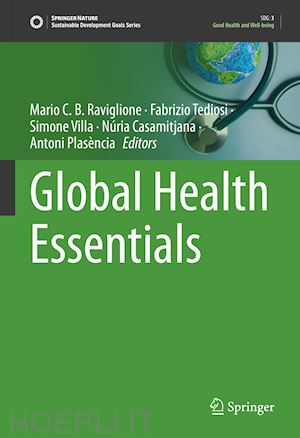

Questo prodotto usufruisce delle SPEDIZIONI GRATIS
selezionando l'opzione Corriere Veloce in fase di ordine.
Pagabile anche con Carta della cultura giovani e del merito, 18App Bonus Cultura e Carta del Docente
This practical and handy textbook offers a succinct yet comprehensive overview of the main challenges, issues and solutions in global health in relation to the UN’s Sustainable Development Goals (SDG) 2030 agenda.
Subdivided into 11 parts, devoted each to a macro-topic, the book opens with an introduction to Global Health followed by an overview of the global burden of disease – from child and maternal health to communicable and non-communicable diseases. The authors further examine the social determinants of health, health systems’ features as well as innovations, governance and methods in Global Health.
In consideration of the emerging discussions and ideas, and beyond the more traditional and essential elements of global health, the book also looks at the need to re-think the whole concept of global health and the importance of a “decolonized” approach that engages low and lower-middle countries fully. One entire part is then devoted to analyzing the major threats tothe health of humanity such as climate change, the need for an ecological approach to health (including “One Health” approaches), and, ultimately, planetary health.
Professor Mario C. Raviglione is Full Professor of Global Health at the Centre for Multidisciplinary Research in Health Sciences (MACH) of the University of Milan, Italy. He is also Honorary Professor at the Queen Mary University of London, UK. Previously, he worked at WHO where he directed the Global Tuberculosis Programme (2003-2017). A graduate from Turin University, Italy, he trained in internal medicine, infectious diseases, and AIDS at Cabrini Medical Centre, New York, and Beth Israel Hospital, Harvard Medical School, Boston. He is one of the most cited authors worldwide in the TB field. His work consists of more than 400 publications on TB, AIDS, infectious diseases and global health in journals and chapters in public health books, including the past 8 editions of the Harrison's Principles of Internal Medicine. His h-index is 116 and his citations over 59,000. Prof. Raviglione has worked with over 50 countries world-wide and hasbeen visiting professor or lectures in major universities including Johns Hopkins, Harvard, Mc Gill, Sydney, Geneva, Liverpool, Pavia, Modena & Reggio Emilia, and Brescia. In 2005 he received the Princess Chichibu TB Global Award. In 2009 he was nominated Fellow of the Royal College of Physicians (F.R.C.P., London, UK). In 2010 he received the Wolfheze 20-Year Jubilee Award (The Netherlands). In 2014 he was appointed a Foundation Fellow of the European Respiratory Society (F.E.R.S.). In 2014 he received the Lifetime Achievement Award by the India International Public Health Conference of the Indian Medical Association. In 2016 he was made Honorary Member of the Russian Society of Physiatry. In 2017, he received the USAID Global Leader Award “in recognition of innovative approach, scientific rigor, and dedicate service in partnership to End TB”. In 2019-2020 he was Professeur Titulaire at the Global Studies Institute of theUniversity of Geneva.
Professor Fabrizio Tediosi is an economist specialized in public health and health systems and policy research. He holds a degree in economics and management from the University of Pavia, a MSc in Health Economics from the University of York, and a PhD in International Public Health from University of Basel. He is Research Group leader at the Department of Public Health and Epidemiology of the Swiss Tropical and Public Health Institute and Titular Professor, Faculty of Science, University of Basel. He is a research leader in health financing; developing and applying methods to evaluate and validate health interventions for delivering them at adequate levels of effective coverage; health policy analysis and evaluation; and the impact of global governance and policy on public health. He has authored over 200 publications, including articles in peer reviewed journals, books, book chapters, and working papers.
DrSimone Villa is a research fellow at the Centre for Multidisciplinary Research in Health Sciences (MACH) of the University of Milan, Italy. He is a young medical doctor who graduated in 2018, with a Master’s degree in Global Health and currently enrolled in the MSc in Epidemiology at the London School of Hygiene and Tropical Medicine, UK. In the past four years he has worked in the field of tuberculosis epidemiology, especially in vulnerable populations (eg, migrants, refugees, and homeless) and anti-TB R&D. He participated in the summer school on Global Health Challenges held at the University of Copenhagen in 2017 and in the WHO summer school on The Health of refugees and migrants: ensuring accessibility, promoting health, and saving lives in 2020. Currently, he is working on two European Commission-funded projects EU-PEARL, that aims to re-think how clinical trials are designed, and UNITE4TB, a 7 years-long phase II clinical trial for newanti-TB regimens. During the COVID-19 pandemic, he has also worked with experts from the Columbia University, McGill University, and Harvard T.H. Chan School of Public Health on an ecological study on COVID-19 mortality presented at the Prince Mahidol Award Conference 2021. He has written books’ chapters on tuberculosis, global health, and nutrition in a planetary health perspective, and has nineteen other publications (h-index 8) in the past two years.
Núria Casamitjana is Director of Training and Education at ISGlobal and Professor at University of Barcelona. She holds a B.A. in Pharmacy and a PhD from UB, and a Master in Occupational Health from University of Barcelona - University Pompeu Fabra.











Il sito utilizza cookie ed altri strumenti di tracciamento che raccolgono informazioni dal dispositivo dell’utente. Oltre ai cookie tecnici ed analitici aggregati, strettamente necessari per il funzionamento di questo sito web, previo consenso dell’utente possono essere installati cookie di profilazione e marketing e cookie dei social media. Cliccando su “Accetto tutti i cookie” saranno attivate tutte le categorie di cookie. Per accettare solo deterninate categorie di cookie, cliccare invece su “Impostazioni cookie”. Chiudendo il banner o continuando a navigare saranno installati solo cookie tecnici. Per maggiori dettagli, consultare la Cookie Policy.